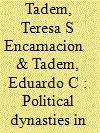| Srl | Item |
| 1 |
ID:
175407


|
|
|
|
|
| Summary/Abstract |
The Philippines is Southeast Asia’s oldest democracy. Yet democratic institutions fail to show coherence in what is largely seen as a resilient oligarchical state that manages to control the state, economy, and society by constantly adapting and shifting along with the political contours. Despite its rich democratic tradition, the country has not been able to reduce centuries old socio-economic inequalities that have sustained clientelistic politics. The continuing failure to consolidate and deepen democracy has negatively impacted the Philippine state, the economy and society. This country study charts the various structural and institutional arrangements and accommodations that have resulted in the country’s defective democratization. Using historical and contemporary process tracing, this study hopes to provide a nuanced understanding of the democratic and not so democratic trajectory that the country continues to experience. By providing a mapping of the defective democracy in the Philippines, this study provides a lens to see the conditions, depth and alterations within the course of pursuing democratization. The distinct and complementing structural and institutional arrangements over the years illustrate how power can lead to various patterns of domination and transformation.
|
|
|
|
|
|
|
|
|
|
|
|
|
|
|
|
| 2 |
ID:
148548


|
|
|
|
|
| Summary/Abstract |
The results of the 2013 Philippine mid-term elections highlighted the dominance of political dynasties in the country. With all 80 provinces littered with political families, 74 percent of the elected members of the House of Representatives came from such dynastic groups. Despite overwhelming recognition that political dynasties breed patronage politics and corruption, no substantial steps have been undertaken to address this issue. This article examines the general nature of Philippine political dynasties, the reasons for their continuing existence and their adverse impact on the country. This problem emanates basically from three factors: (1) the political and socio-economic foundations upon which political dynasties are built; 2) the inability to effectively implement Philippine constitutional provisions by enacting an enabling law; and 3) the weakness of potential countervailing forces that would challenge political dynasties.
|
|
|
|
|
|
|
|
|
|
|
|
|
|
|
|
| 3 |
ID:
176134


|
|
|
|
|
| Summary/Abstract |
Political families are common across many countries in Asia, including Pakistan. Politicians from political families (PPFs) make decisions with the goal of maximizing the political prospects of the entire family, in contrast to non-PPFs, who maximize their individual political self-interest. This changes the impact they have on their country. Scholars find that the presence of PPFs is associated with significantly worse development and governance outcomes, including in Pakistan. However, we know much less about their impact on political outcomes. In this paper, we use original data from a 2018 systematic national survey of about 150 Pakistani politicians to investigate PPFs’ support for key democratic institutions and practices. We find that compared to non-PPFs, Pakistani PPFs are significantly more supportive of instrumentally useful institutions and practices such as free and fair elections, an independent judiciary, and a free media, but no different in their low level of support for human rights.
|
|
|
|
|
|
|
|
|
|
|
|
|
|
|
|